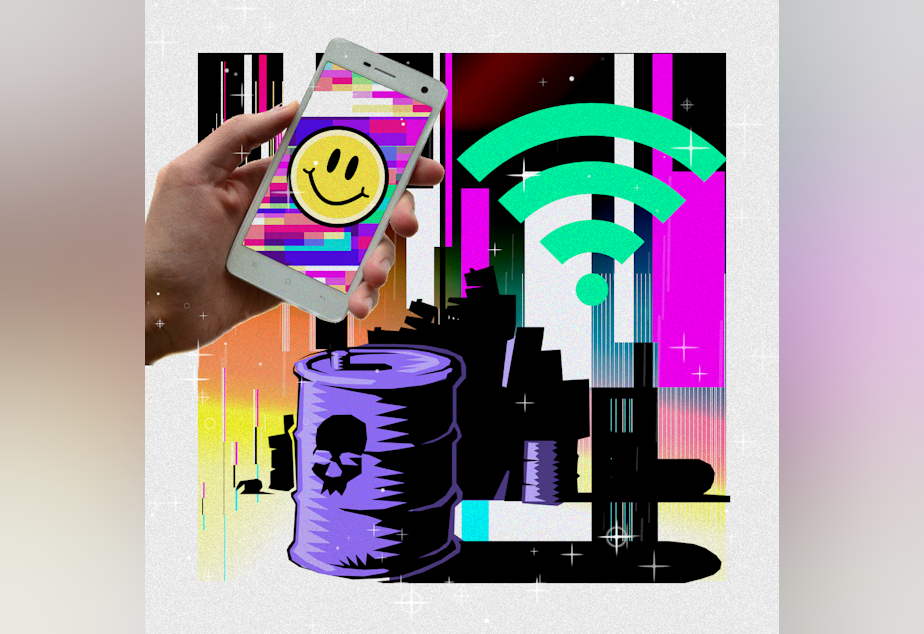The good, the bad, and the internet: Teens on growing up online

If Facebook were a person, it would be older than most RadioActivians. This audio piece explores what it's like to grow up online for four teenagers — from falling in love to facing trolls — and blends nonfiction interviews with an imagined main character: the Internet.
[RadioActive Youth Media is KUOW's radio journalism and audio storytelling program for young people. This episode was entirely youth-produced, from the writing to the audio editing.]
TRANSCRIPT:
THE INTERNET: Welcome to the Internet. Here’s an overview.
[Notification sounds. Music fades in.]
FINCH: I guess the first two things that come to mind are kind of a safe haven and exclusivity, which are weirdly contradictory.
TEYO: They love to argue, they love to say things, and other people don’t like it when they say things.
FREDDIE: Facebook and my little AOL account when I was six years old taught me, you know, don’t give your name to strangers. And don’t give out your information, you know, just the basics of internet safety.
JACKSON: It was a lot of people who wanted two forty-year-old men to kiss a lot, and write fanfictions about how they’re in the ‘50s, and then one of them dies of cancer or something — just very bizarre.
[Music fades in.]
THE INTERNET: I can bring you community. I can bring you acceptance. I can bring you love.
FREDDIE: The best experience I had online was meeting my boyfriend. I was 15 when I met my boyfriend, and we became really good friends right away. And that was almost four years now. We’re still together. Now we’re living together, so, yeah, I’d say that was a pretty positive experience in my life.
FINCH: I ended up making, like, friends on there with a couple of people who were like, really, really, nice and kind and, like, sweet people that actually ended up, like, helping me out a lot.
TEYO: I’ve been able to find, you know, other people who are nonbinary, other people who are people of color, other people who share — who are like me in certain ways and also share my interests.
FREDDIE: As a child, I always kind of figured, like, I wasn’t a little girl. I didn’t refer to myself like that. But I just didn’t have the terminology to refer to myself, like, as I really was. And it wasn’t until I got on the internet that I started to learn these different terms and I learned how to define myself.
FINCH: Oh, this is a thing that other (people) experience that is, like, a thing and not just, like, some weird freak anomaly that I’m experiencing.
THE INTERNET: Some may say I bring discourse, arguments, and anxiety… but is that really my fault?
[Music fades in.]
FREDDIE: It’s so exhausting being a minority on the internet. It just seems like every stupid thought that people have about minorities is being constantly thrown in my face.
FINCH: It can be much more abrupt and being like, "Oh, your name is 'j*w_k*ller.’" [sarcastically] That’s a cool thing to see on my Friday afternoon trying to play a video game with my friends.
FREDDIE: Like, there’s no point in me trying to get into an argument with a racist on the internet. Because I know in the end, I’m just going to be the one who ends up getting hurt.
THE INTERNET: Well… that’s not a great look, I must admit. But I’m not all to blame. I am simply a resource, a tool to be used by others. I allow you to connect. How you choose to do that remains up to you.
FREDDIE: My favorite part of the internet would be, I guess, being able to meet new people so easily, being able to connect with them on things that it would be so much harder to do in person. Like, you know, you can meet someone on a different continent.
TEYO: You know, that kind of connection, which I feel like is sort of the original point of the internet, is sharing information.
JACKSON: Like, I cracked open a coconut the other day because I didn’t know how. And I looked up a YouTube video, and I used a hammer and screwdriver, and it was rotten on the inside. But I did — now I know how to do it.
TEYO: There have been a lot of, like, online games I’ve played with very short-term interaction. Games where you are just like, in a space with people you don’t know and don’t need to connect with. And people against all odds are positive.
I think that is one of the best feelings on the internet is just being, like, these are five people I don’t know, who are being nice, who I’m being nice to. Everyone’s getting along. It’s just a sweet thing. It’s like, "Hey, let’s have fun."
[Music fades in.]
THE INTERNET: From RadioActive...
LUCAS: I’m Lucas Galarneau. Thank you for listening to this RadioActive podcast. Thank you to my interview subjects, Freddie Frogman, Jackson Costello, Teyo Lee, and Finch Cottle-Simon. And thank you to my mentor, Sonya Harris, and my editor, Lila Lakehart.
TEYO: Okay, my favorite social media is going outside on a walk. That’s my answer.
This RadioActive Youth Media podcast was produced in an advanced producers program for high school and college students. Production assistance by Sonya Harris. Prepared for the web by Mary Heisey. Edited by Lila Lakehart.
Find RadioActive on Facebook, Twitter, Instagram, TikTok, and on the RadioActive podcast.
Support for KUOW's RadioActive comes from the Bill & Melinda Gates Foundation Discovery Center.
If you have any feedback on this story, you can email RadioActive at radioactive@kuow.org or find RadioActive on Twitter @kuowradioactive. Or you can just click the feedback button on the right hand side of this page. Reach out. We're listening.
